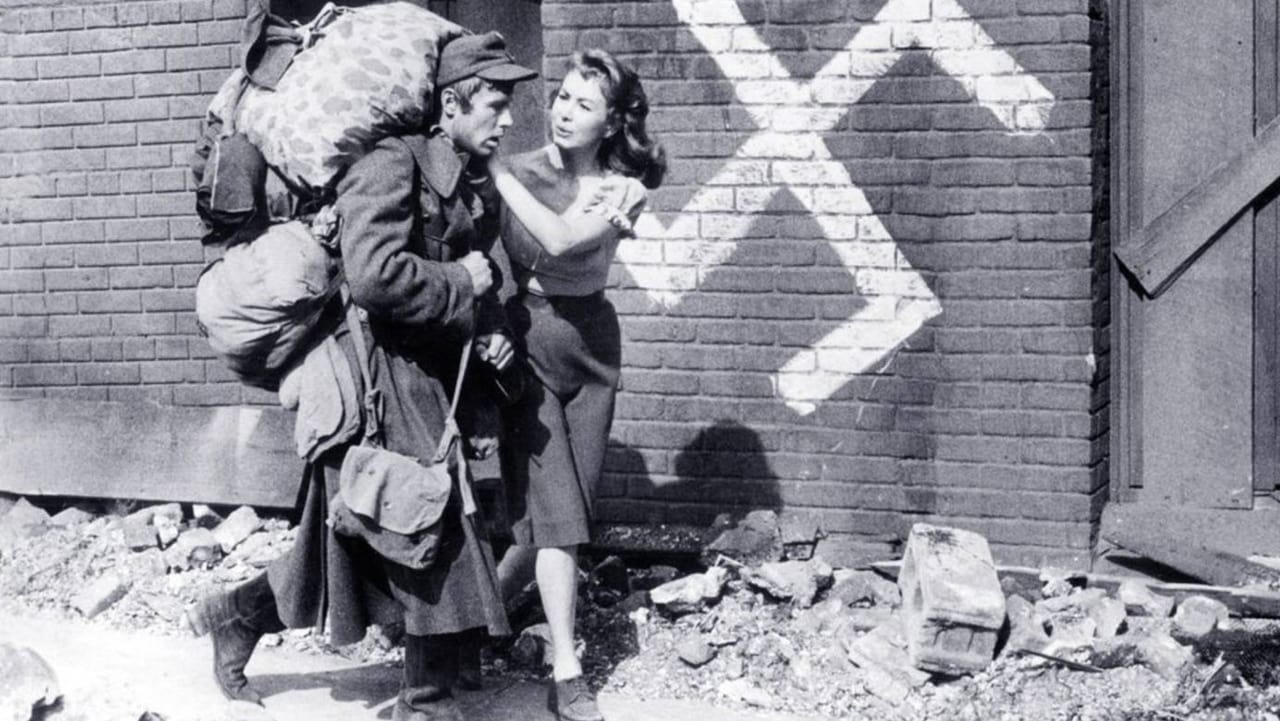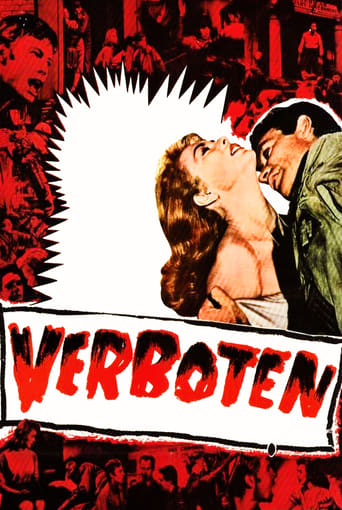Armand
an old movie. not exactly for time passing from its birth but for the themes who are always fresh, for the sets, for the measure of story who impress again and again. a war film and more that. because important remains the way to translate in image, with grace, delicacy and courage a dark side of reality. the photographs, the wallpapers, the dialogs, the scenes from Nuenberg trial, the story story itself are tools for a clear and objective picture of period. and that fact remain great , more important, in fact, than the artistic virtues. the equilibrium - that is the essential thing who defines Verboten ! and who gives to its poetic moments more force.
LeonLouisRicci
There is Only One Sam Fuller and His Detractors might say that was Certainly Enough. But No One can Argue that Sam Fuller made Boring, Uninteresting, or Common Movies. He was Anything but Common.While watching a Fuller Movie one is Struck by the Audaciousness as it Unspools with the Usual Low-Budget and Barely Professional Actors. For His Films are all about the Subject. Be it War, Western, Crime, or any Number of Odd Stories He chose to do, Sam Fuller always gave His Heart and Soul.In this WWII Movie it is the Very End and Post War Germany that is the Setting and the Nazis have been Reduced to Nothing More than a Street Gang and the Occupiers are Struggling to keep all the Threads of Society from coming Unraveled. The Most Basic Things like Food and Medicine are in Short Supply and there is Never a Shortage of Suffering People.This is just some of the Layers that Fuller Uses here to Elicit a Template of Surreal Cynicism. The Claustrophobic Sets and the Dense Lighting also Manage a Meilu of a Hell on Earth. Posters and Leaflets are Wallpaper and Signposts and the Love Story is not only Edgy but Verboten. This is the Writer/Director's Vintage Heavy Handedness that is a Delight to Watch and is Another Example why there is Only One Sam Fuller.
MisterWhiplash
Samuel Fuller knows war, and is one of the only directors in American movie history who could accurately portray the horrific experiences of it in a form like the motion picture. His pessimism and idealism, if that sounds a little odd to mix together, work for him as a storyteller, and at the same time he's always out to tell the truth, however brutal (or put into melodramatic constructs) it can get. Verboten, however, deals with the post-war experience, as we only get in the opening scenes the big boom of WAR- in bold for a point. The opening shot is like one big exclamation point that seems to continue on into the rest of the scenes: a dead soldier on the ground, the camera pans up, we see another soldier shot down in war-torn terrain. Simple, direct language. Then Fuller punctuates the intensity with something interesting: the title song played over the opening credits as both irony and sincerity, and then Beethoven music over a shoot-out between Americans and the Nazis. Sgt David Brent (James Best) is shot, the battle goes on, and then it transitions to him being treated for his wounds.It might lead one to believe that this will be a somewhat conventional WW2 flick (somewhat in that one usually wouldn't find Beethoven and, later on to an extent, Wagner put into these images), but this isn't the case. Instead, Fuller makes this a 'Coming Home' kind of movie, though not at all in the sense that 'this soldier comes home injured and so on and so on'. Instead of really going home, Brent stays on in Germany, as he's fallen head over heels for the woman, Helga (Susan Cummings, pretty good at pulling off the German accent), and wants to work in a smaller capacity in the military so he can marry her. What he doesn't realize is that a) she wants him more for money so she can get food for herself and brother, however this gets complex emotionally at the point of revelation to the slightly naive but heartfelt Brent, and b) there's an underground Hitler youth sect called the Werewolves, who want to pick right up off where Hitler ended- starting small, despite argument within the group- by attacking the very government that's now embedded in Germany to give them, as Brent describes, a "blood transfusion." With this, plus footage from the Nuremburg trials, and (as narrated, I think, by Fuller himself) a quick, no-punches-pulled history of the Nazi war crimes piece by piece, we get a multi-faceted look at a society in the dire straits of an immediate post-war environment. While Rossellini handled it his own way with Germany Year Zero, Fuller tackles it with layers: first there's the love story, or what is the tragic downfall of a man who can't see anything past what he thinks should be reasonable, that it's his wife and a child on the way that he can't leave, until the revelation that he's (partly) been swindled. Baker and Cummings, along with Harold Daye as Helga's young, confused brother, perform at with the utmost detail to emotions; these aren't very easy B-movie parts, though they could've been that. Then another layer is the political one, the struggle of a society to come to grips with being conquered, and a mentality which is made sensationalized, to be sure, by Fuller, in respect to making the Nazi's a total no-gray-area thing: they're evil, particularly when they cancel out reason to meet their ends.And finally there's the layer of style, which is strangely absorbing. This is probably one of Fuller's 'talkiest' films, which isn't a bad thing considering it's one of his best written scripts, as the characters don't talk simply or in too many platitudes (with the exception of a small scene where two characters talk about the Hitler youth as juvenile delinquents, which is actually, according to Fuller's autobiography, probably another layer to consider in the subtext and the 50s period of movies). And Fuller shoots this almost in a real European style, when he's not going for fight scenes or battles, as the editing isn't always very fast, and sometimes a cut won't happen for a full minute, or longer. There's an odd tension that grows out of this, especially when there's something said by a character that gets another one wild-eyed or suspicious; Fuller could easily go for a big close-up, but there's a more sinister, cold quality to not moving away from two people in a conversation without a simple over-the-shoulder deal. But when it requires it, like the big brawl outside the American military office, or the Nuremburg footage spliced into Franz's memories of the Werewolves, Fuller can be as stunning stylist as ever.Very hard to find, but extremely worth it if you'r either a fan of the director's or of WW2 movies set in Germany- or even just a history-buff- Verboten! is an intellectual experience and a strong emotional one, with a cast that is better than expected from a B-movie, and an attitude towards the 'other' that is equally damning and thought provoking.
hcoursen
I enjoyed this for a couple of reasons. The emotional tangle was at times confusing and imperfectly resolved, but the blend of newsreel footage with the film's narrative was often compelling. The other element that I appreciated was the depiction of the Werewolves, the fanatical Nazis who continued the fight after the formal surrender. I don't know of another film that deals with them. They assassinated Burgomaster Oppenhoff of Aachen on Palm Sunday, 1945, for example, and did create problems for the occupation. The film, then, challenges the sanitized version of victory and occupation with some gritty realities. The "human issues" are presented not so much through the characters here, but through the historical reality that was gripping those who had survived Hitler -- both conquered and victors.

